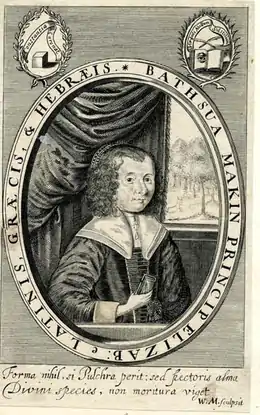Bathsua Makin
Bathsua Reginald Makin (c. 1600 – c. 1675) est une protoféministe de la classe moyenne anglaise qui a contribué aux critiques émergentes sur la place des femmes dans les sphères domestiques et publiques dans l'Angleterre du XVIIe siècle. Elle peut être considéré comme un précurseur du féminisme.
Elle est célèbre pour son traité polémique intitulé An Essay To Revive the Antient Education of Gentlewomen, in Religion, Manners, Arts & Tongues, with an Answer to the Objections against this Way of Education (1673)[1].
Références
- Brink, Jean R. "Bathsua Makin: Educator and Linguist.” Female Scholars: A Tradition of Learned Women Before 1800. Ed. J.R. Brink. Montreal: Eden P, 1980. 86–100.
- Brink, Jean R. “Bathsua Reginald Makin: ‘Most Learned Matron.’” Huntington Library Quarterly 54 (1991). 313-26.
- Ferguson, Moira. First Feminists: British Women Writers 1578–1799. Bloomington: Indiana UP, 1985. 128–42.
- Fraser, Antonia. The Weaker Vessel: Woman’s Lot in Seventeenth-Century England.London: Weidenfeld and Nicolson, 1984.
- Gim, Lisa. ““Faire Eliza’s Chaine”: Two Female Writers’ Literary Links to Queen Elizabeth I.” Maids and Mistresses, Cousin and Queens: Women’s Alliances In Early Modern England. Eds. Susan Frye and Karen Robertson. New York: Oxford UP, 1999. 183–98.
- Hamilton, Patricia L. “Bathsua Makin’s Essay and Daniel Defoe’s "An Academy for Women." Seventeenth-Century News 59 (2001) 146-53.
- Helm, James L. “Bathsua Makin’s An Essay to Revive the Antient Education of Gentlewomen in the Canon of Seventeenth-Century Educational Reform Tracts.”Cahiers Elisabethains 44 (1993). 45–51.
- Hobby, Elaine. Virtue of Necessity: English Women’s Writing 1646–1688. London: Virago, 1998. 1–26, 190–203.
- Mahl, Mary R. and Helene Koon. Eds. The Female Spectator: English Women Writers Before 1800. Bloomington and London: Indiana UP, 1977.
- Makin, Bathsua. An Essay to Revive the Ancient Education of Gentlewomen. From Frances Teague. Bathsua Makin, Woman of Learning. 109–50.
- Myers, Mitzi. “Domesticating Minerva: Bathsua Makin’s “Curious” Argument for Women’s Education.” Studies in Eighteenth-Century Culture 14 (1985) 173-92.
- Smith, Hilda L. Reason’s Disciples: Seventeenth-Century English Feminists. Chicago: U of Illinois P, 1982.
- Stone Stanton, Kamille. "Women kept ignorant on purpose to make them slaves": Bathsua Makin's Orthodox Voice in the Literary History of Early British Feminism." Interactions 18.2 (2009), 141–148.
- Teague, Frances. Bathsua Makin, Woman of Learning. Lewisburg: Bucknell UP & Associated UP, 1998.
- Teague, Frances. “Bathsua Makin: Woman of Learning.” Women Writers of the Seventeenth Century. Katherina M. Wilson and Frank J. Warnke. Eds. Athens: U of Georgia P, 1989. 285–304.
- Teague, Frances. “The Identity of Bathsua Makin.” Biography 16:1 (1993). 1–17.
- Teague, Frances. “New Light on Bathsua Makin.” Seventeenth-Century News 16 (1986). 16.
- Teague, Frances. "A Voice for Hermaphroditical Education." In This Double Voice: Gendered Writing in Early Modern England 249–269. Eds. Elizabeth and Danielle Clarke. London: Macmillan, 2000.
- Weitz (Miller), Nancy. "Ethos, Authority, and Virtue for Seventeenth-Century Women Writers: The Case of Bathsua Makin's An Essay to Revive the Antient Education of Gentlewomen (1673)." Listening to Their Voices: The Rhetorical Activities of Historical Women. Ed. Molly Meijer Wertheimer. Columbia, SC: University of South Carolina Press, 1997: 272–87.
- Wilson, Katharina and Frank J. Warnke. “Introduction.” Women Writers of the Seventeenth Century. Eds. Katherina M. Wilson and Frank J. Warnke. Athens: U of Georgia P, 1989. xi–xxiii.
Notes
Liens externes
- An Essay To Revive the Antient Education of Gentlewomen, in Religion, Manners, Arts & Tongues, With An Answer to the Objections against this Way of Education sur A Celebration of Women Writers.
- Ressources relatives aux beaux-arts :
- (en) British Museum
- (en) National Portrait Gallery
- Notices dans des dictionnaires ou encyclopédies généralistes :
Cet article est issu de wikipedia. Text licence: CC BY-SA 4.0, Des conditions supplémentaires peuvent s’appliquer aux fichiers multimédias.
